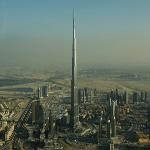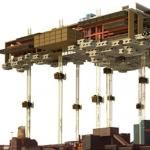
BOB DOUGHTY: I'm Bob Doughty.
STEVE EMBER: And I'm Steve Ember with EXPLORATIONS in VOA Special English. Today we look up into the skies to explore the past and present of the tallest buildings in the world. Skyscrapers were first built in the late 19th century. Engineers then probably would not believe the soaring heights of today's tallest buildings.
Skyscrapers represent modernity, power, and the expanding boundaries of human invention and new technology.
(MUSIC)
BOB DOUGHTY: Skyscrapers were invented in the United States. As early as the 1880s, two new technical developments made these taller buildings possible. One development was the mechanical elevator. It meant that people would not have to climb many steps to reach the upper floors of tall buildings. The development of steel building technology also helped make taller buildings possible.
Many experts consider the Home Insurance Building in Chicago, Illinois to be the first skyscraper. Built in 1885 and later expanded, this tower was about 55 meters tall.
STEVE EMBER: Today this would not be considered much of a skyscraper. But at the time, this height was striking. The structure was built using a steel frame. This frame was load-bearing, meaning that the steel skeleton would support the building's weight, not its walls. Before this technology, a taller building required creating thicker stone walls to support its weight. Thick walls are extremely heavy, and allow less room for windows and light.
William Jenney was the engineer who helped build the Home Insurance Building. He realized the possibilities that steel frames could offer. Some people consider him the father of the skyscraper.
Soon after his building was finished, builders in Chicago and New York City began copying and improving on the idea of building up. Builders in these cities and others would also begin competing for the title of "tallest building."
(MUSIC)
BOB DOUGHTY: The Empire State Building in New York City is probably one of the most famous skyscrapers in the world. It held the title of tallest building for over 40 years. It was completed in 1931 and stands 381 meters tall.
The next building to hold the record no longer exists. One World Trade Center tower in New York City was completed in 1972. It measured 417 meters. It was destroyed in the terrorist attacks of September 11th, 2001. Chicago's Sears Tower is now called the Willis Tower. It became the world's tallest building in 1974, at 442 meters.
The next records for tallest buildings are in other countries. The two Petronas Towers in Kuala Lumpur, Malaysia measure 452 meters. They were followed by the Taipei 101 building in Taiwan, which is 508 meters tall.
STEVE EMBER: The most recent addition to this list is the Burj Khalifa in Dubai in the United Arab Emirates. This building measures 828 meters in height. It cost an estimated one and a half billion dollars to create. It contains space for apartments, offices, a restaurant, hotel and Muslim religious center. The building's footprint is shaped like a "Y", with three wings extending from its center. This design was influenced by the shape of a desert flower that grows in the area. The building's Web site says that as many as 12,000 people were working on the building at the same time.
The Burj Khalifa was built as a major attraction for travelers and business people. But the timing of its opening in January has been difficult. In December, Dubai entered a major debt crisis. And in February, the Burj Khalifa closed its observation deck, reportedly because of electrical problems.
(MUSIC)
BOB DOUGHTY: You might be wondering how the height of a building is officially measured. The Council on Tall Buildings and Urban Habitat is in Chicago, Illinois. The group is supported by building designers and experts connected to the operation of tall buildings. The Council helps decide on the official heights of buildings. The Council also sets rules about what defines a building. For example, the CN Tower in Toronto, Canada is not included in the tallest building category because it is a communication tower. To be a building, half of a structure's height must have usable floor space.
STEVE EMBER: Calculating building height was not a complex measurement in the late 19th century with early skyscrapers like the Home Insurance Building in Chicago. The Council explains on its Web site that early tall buildings were generally measured from the ground floor to the top of the building, not including flagpoles. By the 1930s, some of the possible record-making skyscrapers were being designed with spires. Spires are the thin, pointy tops of buildings. These spires were considered an architectural part of the building, so their length was included in the building's height measurement.
BOB DOUGHTY: Sometimes measurements can lead to debates and disputes. The Council on Tall Buildings and Urban Habitat decided in 1996 to include the height of the spires of the Petronas Towers. This led to its surpassing the height of the Sears Tower in Chicago by about ten meters. Many people felt this was unfair, because the Sears Tower's tall antenna was not included in the official height measurement.
As a result, the Council now considers other height categories, such as highest occupied floor and highest antenna. The Burj Khalifa in Dubai is not only the world's tallest building architecturally. It is also the tallest building when measuring height to tip, and highest occupied floors. But this record will probably not last for long. Builders in Dubai and China have already started plans for surpassing the Burj Khalifa's height.
(MUSIC)
STEVE EMBER: So far, we have discussed the reality of skyscrapers. But what would tall buildings look like if your imagination was the only limit? A building design magazine called eVolo has been published for about two years. A group of architecture students at Columbia University in New York started eVolo. The magazine also holds a yearly skyscraper competition for the best ideas for redefining the role of skyscrapers.
BOB DOUGHTY: Carlo Aiello is the editor of the magazine. He says that skyscrapers are clearly popular around the world because they provide a huge amount of shelter and use less land space. But he says they also act as representations of a country's wealth and geopolitical power. He wanted the eVolo skyscraper competition to be less about the height of the buildings, and more about supporting environmental and community responsibility. The aim of the award is also to bring attention to the ideas of young designers.
STEVE EMBER: Judges for this contest studied how each design looks and how it uses new technologies and materials. This year there were 430 entries from 42 countries. The judges chose three winners and gave special recognition to 27 others.

First place went to a design for a skyscraper jail made by architecture students in Malaysia. Their aim was to create a prison city in the sky. It was designed to permit prisoners to live free and productive lives that would help people in the city below. The jail would contain fields and factories so that the prisoners could work to provide services to the larger community. The idea was to make it easier for prisoners to rejoin their communities after they served their jail sentences.
BOB DOUGHTY: Second place went to a team in Indonesia. They designed a large building that would clean a polluted river in Jakarta.
And, third place went to a team in the United States for their "Nested Skyscraper." Built like a robot, this building can change, based on the conditions of the climate and city around it. The designers wanted to rethink the fixed and boxy skyscraper. Their building can bend, move, and change to be more useful in its setting in Tokyo, Japan.
These interesting buildings are helping to show what skyscrapers and our cities might look like in the future.
(MUSIC)
STEVE EMBER: This program was written and produced by Dana Demange. I'm Steve Ember.
BOB DOUGHTY: And I'm Bob Doughty. You can comment on this program on our Web site, voaspecialenglish.com. You can also see pictures of the winning eVolo skyscraper design. Join us again next week for EXPLORATIONS in VOA Special English.
Ted Nash plays jazz inspired by art
Who were the deadliest gunmen of the Wild West?
Famous outlaws and gunmen of the Wild West
Explorers, danger and a guiding presence
(來源:VOA 編輯:陳丹妮)
